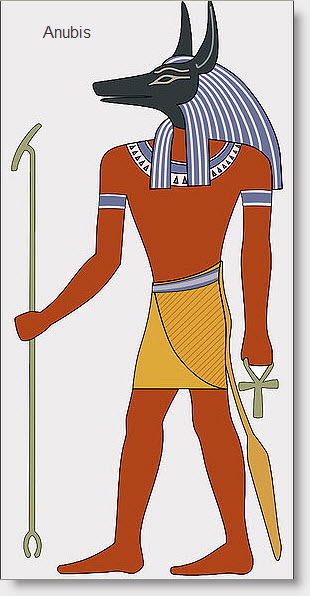Anubis

Anubis.
Anubis is the Greek name of a god of Egyptian mythology whose name Inpou Anepou or "he who has the head of a jackal (or a wild dog)" in the hieroglyphic language. Associated with the funeral cult and the protection of the deceased, he is represented as a black canid (jackal or wild dog) or elongated like a man-headed canine. He accompanied the dead in the other world and protected their graves.
Jackals and wild dogs roamed the desolate stretches where the cemeteries and necropolises were located. These marauders likely did not hesitate to dig up the corpses for food. So as to gain protection from these scavengers, the ancient Egyptians deified these animals and made offerings to them in order to gain their good graces. Anubis was the personification of these animals and during Pharaonic times was considered an important funerary deity. He was often referred to by descriptive phrases such as Tépy-djouf, "He who sits on the mountain"; Khenty-seh-Netjer, "President of the divine pavilion (which runs embalming) and Neb ta Djoser, "Lord of the Necropolis.
From the Old Kingdom, Anubis presided over the ceremony of embalming and the opening of the eyes and mouth, thus repeating the miracle he had done for Osiris. From the Fifth Dynasty, Anubis was superseded by Osiris in this task and became the assistant. During embalming, the head priest-embalmers (the séshéta-Hery, "Higher Mysteries") wore a mask bearing the image of Anubis.
On the walls of the first mastabas, one finds prayers for the survival of the body after death addressed to Anubis, and not yet Osiris. From the beginning of the Anubis cult, Anubis was both the guardian and guide of the deceased. Thus, one often finds at the entrance of the tombs two statues of Anubis, in the form of an elongated canine, facing each other. These were meant to act as a barrier against the evil forces trying to disturb the eternal repose of the deceased.
In pyramid texts, Anubis is the guide who led the deceased through the underworld to the hall of Maat, the divine court and ensured the smooth running of the weighing of the heart (the psychostasy). Also ruler of the dead, Anubis was quickly surpassed in this role by Osiris who gradually assimilated its most important powers and ended up making Anubis a second-place god. Anubis becomes the guardian of the gates of the kingdom of the dead and is sometimes depicted with a key in his hand,in his anthropomorphic form, or attached to a collar in his canine form.
Anubis was the predominant funerary god and came to assimilate other related canine deities such as Wepwawet, Khentamentiou, and even the gods Ha, Amenti and Seker.The consort of Anubis is the goddess Anupet (Inpout or Anepout in Egyptian), canine goddess of funerals and the desert.
His ancestry is unclear. In some Egyptian myths, Anubis is said to be the fourth son of Ra, the son of Bastet or Hesat, illegitimate son of Osiris and Nephthys, or at a later age, that of Osiris and Isis. The most common tradition, narrated in the myth of Osiris, is that Anubis was in fact the result of illegitimate relations between Osiris and his sister Nephthys (wife of Seth). The latter, fearing the wrath of her husband, hid his offspring in the swamps. Although she knows her husband's infidelity, Isis (Osiris' wife) took the child, raised Anubis and made him one of her most faithful allies. After Seth had killed Osiris and scattered his remains, Anubis helped Isis and Nephthys to rebuild his body and presided over the first mummification.
According to the papyrus Jumilhac (VI, 6-7), Anubis took its name from his mother Isis. We learn that his name "was pronounced with respect to wind, water and desert," which three words are the symbolic representations of the three hieroglyphs that make up the root name of Anubis.
pyramids Egypt Mummies Search Engines Link Report
Egyptian Cities | Egyptian Education | Ancient Egypt | egyptian clothing | Egyptian Houses | The Egyptians | Egyptian Family Life | Egypt and its Neighbours | Government in Ancient Egypt | Egyptian History | Military | Organization of Ancient Egypt | Recreation | Egyptian Religion | Pyramids | About | Privacy Policy | Site News | Site Map
EgyptPast.com - Facts and Information About the History of Ancient Egypt
-